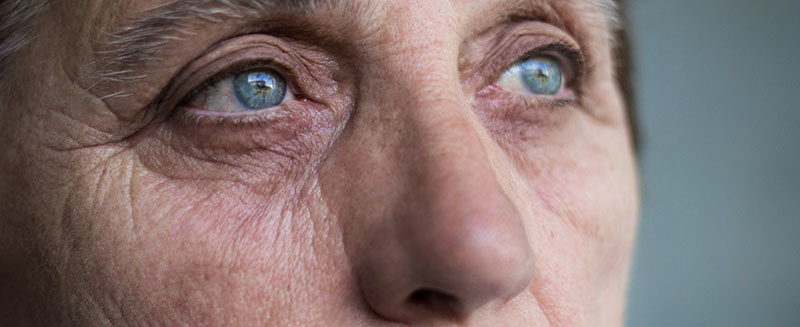
Eye problems are common among people with Alzheimer’s and dementia.
The intricate steps connected to making it possible for us to see are fascinating. In the blink of an eye, our brains are able to take data sent from our environment, decipher that information based on input from our other thoughts, senses, and experiences, and then formulate an understanding of that data to help make us cognizant of what it is we’re seeing.
Given these complexities, it is understandable that Alzheimer’s may impact a person’s sight, causing misperceptions and visual deficits, especially in the areas of:
- Depth perception
- Color perception
- Contrast
- Movement recognition
- Peripheral vision
As if that were not challenging enough, seniors with dementia can experience a distorted sense of reality in the form of delusions. For example, imagine a person with Alzheimer’s disease or other kind of dementia sees a shadow on the floor. The senior might mistake it for something innocent, like the family’s pet dog, or a danger, like an intruder. Further forms of visual misunderstandings in dementia could include:
- Misinterpreting their own reflections in a window or mirror for another person. This may lead the senior to believe somebody else is there, and in the case of a bathroom mirror, may lead the senior to avoid going in when needed, causing discomfort and distress.
- Assuming that images from the television are real and taking place in the room.
- Issues with sitting in a chair or on the commode, fearing they will fall.
- Feeling overwhelmed in overstimulating situations that can cause confusion.
- Reaching out for items that aren’t there, or missing the mark in attempting to pick up something.
- Difficulties with eating and drinking.
Try these ideas to help a senior with dementia who is challenged by eye problems:
- Make sure there is enough light throughout the home, and take away any items that are creating stress or visual confusion, if at all possible.
- Use contrasting colors. For example, serve a light-colored cream soup in a dark bowl.
- Close all blinds or drapes at night as well as whenever the sunlight causes a glare.
- Use adaptive equipment like remote controls and phones with larger buttons to help encourage the senior to maintain self-reliance in spite of visual difficulties.
Live Free Home Health Care’s home care specialists in Concord, NH and the surrounding communities are committed to making sure the older adults we care for are always safe and thriving. Our skilled dementia care specialists understand the visual and other changes that occur, and are equipped with innovative, compassionate methods to help.
To learn more about our in-home dementia care services, or to request additional resources relevant to caring for a senior at home, contact us today at 603-217-0149.
